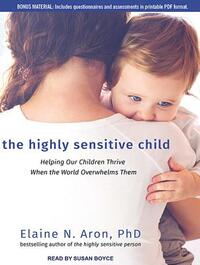Take a photo of a barcode or cover
101 reviews for:
The Highly Sensitive Child: Helping Our Children Thrive When the World Overwhelms Them
Elaine N. Aron
101 reviews for:
The Highly Sensitive Child: Helping Our Children Thrive When the World Overwhelms Them
Elaine N. Aron
hopeful
informative
inspiring
medium-paced
This as an interesting book and I'm glad I read it. That said, I was expecting that it would include even more research-based evidence rather than personal anecdotes of the author's son, although some were helpful. Basically the book reminds parents of HSCs to be empathetic, know their child, and adjust and plan accordingly.
challenging
emotional
hopeful
informative
reflective
sad
slow-paced
informative
medium-paced
Lots of insight on raising a Highly Sensitive Child. A few outdated comments about image/weight and some general parenting advice that is not as recommended anymore. But maybe the newer editions have fixed those points.
challenging
funny
hopeful
informative
reflective
slow-paced
This book has been incredibly helpful for our whole family. Honestly, I would give it a five star rating for a brief paragraph that says something that NO OTHER book I've read acknowledges: More babies sleep through the night at four months than at five months. My daughter slept well for her first four months, and then by six months she was teething, growing, learning all kinds of new mobility skills, AND dealing with a new separation anxiety. Her sleep became very interrupted, but half of the books out there have plans to get your kid sleeping through the night by four months, and act like if you have problems after that, you must not have really done what they told you to do. /end baby sleep book rant
All three of us are highly sensitive, and it's been freeing to have a new way to understand ourselves and each other. While I think most of the advice will be more helpful when she is older, it was affirming to realize that we'd done some things right, just because we already understood what she needed, since it is what we need ourselves, or needed when we were younger. I have been attributing much of it, though, to introversion. Now that she's a little older and finding a lot of independence, the introversion hasn't been fitting quite as well, so I'm glad to have a framework that continues to make sense. It also gives me an explanation for the characteristics she had as a baby. I have not felt as secure in the way we handled some of those difficulties, because I was not able to describe them with a trait like introversion, and because common advice would blame our parenting for allowing the difficulties to continue, even though the alternatives that didn't feel right to us also didn't work when we attempted them. Being an HSC explains the times when she's slept terribly, and why she can be a completely different child when travelling or having company.
My only criticism is that she is somewhat dismissive of homeschooling, when it seems like it should be a real consideration for most HSCs. Separating academics from the social pressures of school and the overstimulation of our current school systems would alleviate, if not eliminate, most of the academic problems she discusses. Plus, homeschooling gives much more time and opportunity for finding friends outside of school, which is something she recommends frequently.
This book is packed with great information for the parent of a highly sensitive child. That trait only applies to 15-20% of the population, so this isn't a book I'd recommend to everyone. There is a test to determine if your child is highly sensitive between the introduction and the first chapter (also available on her website), so I would encourage any parent wondering about their own child and if this book would be valuable to them, to start there before buying.
All three of us are highly sensitive, and it's been freeing to have a new way to understand ourselves and each other. While I think most of the advice will be more helpful when she is older, it was affirming to realize that we'd done some things right, just because we already understood what she needed, since it is what we need ourselves, or needed when we were younger. I have been attributing much of it, though, to introversion. Now that she's a little older and finding a lot of independence, the introversion hasn't been fitting quite as well, so I'm glad to have a framework that continues to make sense. It also gives me an explanation for the characteristics she had as a baby. I have not felt as secure in the way we handled some of those difficulties, because I was not able to describe them with a trait like introversion, and because common advice would blame our parenting for allowing the difficulties to continue, even though the alternatives that didn't feel right to us also didn't work when we attempted them. Being an HSC explains the times when she's slept terribly, and why she can be a completely different child when travelling or having company.
My only criticism is that she is somewhat dismissive of homeschooling, when it seems like it should be a real consideration for most HSCs. Separating academics from the social pressures of school and the overstimulation of our current school systems would alleviate, if not eliminate, most of the academic problems she discusses. Plus, homeschooling gives much more time and opportunity for finding friends outside of school, which is something she recommends frequently.
This book is packed with great information for the parent of a highly sensitive child. That trait only applies to 15-20% of the population, so this isn't a book I'd recommend to everyone. There is a test to determine if your child is highly sensitive between the introduction and the first chapter (also available on her website), so I would encourage any parent wondering about their own child and if this book would be valuable to them, to start there before buying.
informative
medium-paced
Great overview and explanation of what a Highly Sensitive Child is. I would definitely recommend this book if you are or suspect you are living with an HSP child. I had already done lots of research and knew that I was indeed living with one. I would have liked to have seen less explanation and more how-to type chapters such as how to be more supportive, when to let them figure it out by themselves and when to let go, how to minimize melt-downs. Basic tips and tricks to try with this little gift I have been given to help her cherish her uniqueness and cope with the harsh world. The case study examples were great in showing how different families dealt with their HSP issues. Overall, it is a great book but I needed a bit more. I felt a little deceived by the title as I needed an instruction guide to parenting an HSP! If only it were that simple.
Let me begin by saying that there is a lot of good content in this book. Much of the advise is very practical even for parents of non-HSCs.
That being said, the author was a bit over the top on the "special abilities" of HSCs. She at times made them see a mutant race destined to become the exclusive leaders of the free world. It is certainly important to highlight the upsides of vein sensitive, but much of the language used was excessively superlative.
Finally, the author described people as being either HSCs or non HSCs. She says the distribution of of HSC traits is not a bell curve, as would be expected with a random distribution. It is instead a flat line. That distribution still shows a continuum of HSC traits. If people were truly either HSC or non-HSC the distribution would be bi-modal rather than flat. So since the distribution is flat this indicates that people fall in a spectrum of having various degrees of HSC traits, which matches my experience (albeit limited).
In the end, this book does have much good content and was worth reading.
That being said, the author was a bit over the top on the "special abilities" of HSCs. She at times made them see a mutant race destined to become the exclusive leaders of the free world. It is certainly important to highlight the upsides of vein sensitive, but much of the language used was excessively superlative.
Finally, the author described people as being either HSCs or non HSCs. She says the distribution of of HSC traits is not a bell curve, as would be expected with a random distribution. It is instead a flat line. That distribution still shows a continuum of HSC traits. If people were truly either HSC or non-HSC the distribution would be bi-modal rather than flat. So since the distribution is flat this indicates that people fall in a spectrum of having various degrees of HSC traits, which matches my experience (albeit limited).
In the end, this book does have much good content and was worth reading.



